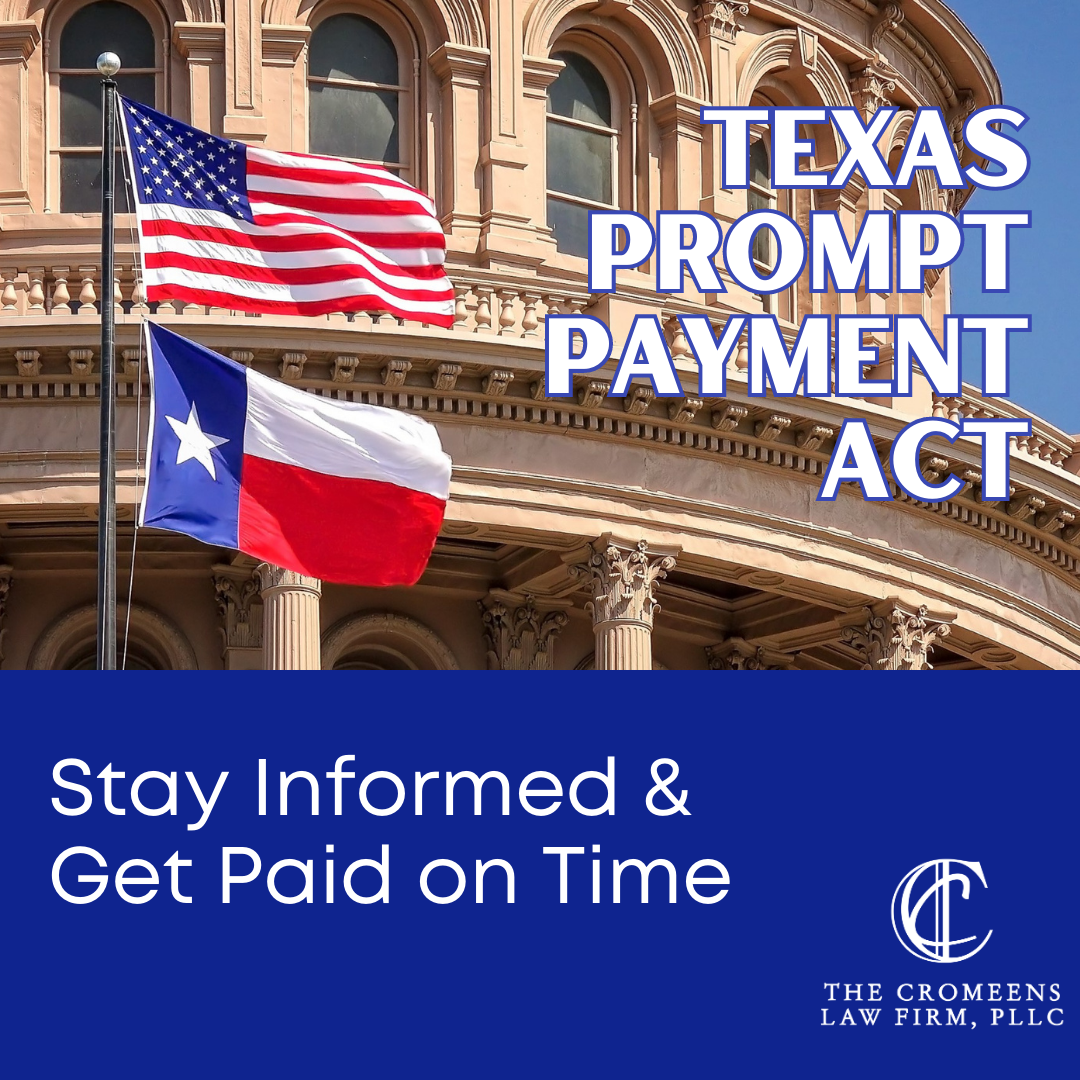

If you’re a contractor or subcontractor working in the construction industry in Texas, you’ll want to pay attention to the Texas Prompt Payment Act. This important state law governs payment practices for construction projects in Texas. Late payments can lead to serious financial consequences, and nobody likes a late-paying client. Don’t worry, we’re here to help you navigate the ins and outs of the Texas Prompt Payment Act.
It is a state law that provides legal protection for contractors and subcontractors who work on construction projects in Texas. The law sets strict deadlines for payment and penalties for late payment, which can help ensure that those who provide labor and materials on a project are compensated in a timely manner.
Let’s look at the facts. The State of Texas Prompt Payment Act, found in Chapter 28 of the Texas Property Code, calls for prompt payment for work performed on private, residential, and commercial projects. The requisite for prompt payment on public works jobs can be found in Texas Government Code Section 2251. But what exactly does prompt payment mean, and how do you enforce it? Here, we’ll list out the details you need to know about the Act and how it differs between private projects and public works projects.
One of the key features of the Texas Prompt Payment Act is the requirement for general contractors to pay their subcontractors within a certain timeframe. You can ensure your team is especially communicative and invest in an airtight contract, but above all else, you must establish a timeline. Your timeline will make these laws enforceable, so be sure you clearly detail your schedule in your construction contract. If a general contractor receives payment for work performed by a subcontractor, they must pay the subcontractor within seven days of the receipt of payment. If a dispute arises over the quality or quantity of work performed, the general contractor may withhold up to 150% of the disputed amount but must still pay the undisputed amount within the seven-day timeframe.
In addition, the Act requires that a contractor or owner who receives an invoice for work or materials provide payment within 35 days. If payment is not made within this timeframe, the contractor or owner may be subject to penalties and interest charges on the 36th day and onward.
One penalty that can be imposed under the Texas Prompt Payment Act is interest charges. If a payment is not made on time, the contractor or owner may be required to pay interest at a rate of 1.5% per month on the unpaid balance. This interest can quickly add up, making it costly for those who do not pay on time.
Collecting what is yours is crucial to the livelihood of your business. We have a team ready to take your call to protect what is yours, collect what is yours, and educate yourself on the front-end!
Another penalty that can be imposed is the right of a contractor or subcontractor to stop work on the project. If a payment is not made on time, the contractor or subcontractor may give written notice that they will stop work if payment is not received within 10 days. If payment is still not received, the contractor or subcontractor may stop work without penalty and may be entitled to damages for the delay.
The Texas Prompt Payment Act also requires that certain information be included in contracts between contractors and subcontractors. Specifically, contracts must include information about payment schedules, interest rates for late payments, and the right to stop work for non-payment.
For contractors and subcontractors, the Texas Prompt Payment Act provides a level of protection against non-payment or delayed payment. By setting strict deadlines and penalties for noncompliance, the law gives contractors and subcontractors more leverage to ensure they are paid on time and in full. This is particularly important for small businesses and independent contractors who may not have the financial resources to weather delays in payment.
However, it’s important to note that the Texas Prompt Payment Act does not provide blanket protection against non-payment. If a contractor or subcontractor fails to meet their obligations under the contract, such as providing substandard work or not completing the project on time, they may not be entitled to payment under the law. Disputes over the quality or quantity of work performed may also delay payment and require legal action to resolve.
The Texas Prompt Payment Act is an important legal protection for contractors and subcontractors in Texas. By setting strict payment deadlines and penalties for noncompliance, the law provides a level of security for those who work in the construction industry. Having a skilled Texas construction attorney on hand to help you navigate this is highly recommended. Connect with a construction lawyer on our team to ensure the entire process is followed correctly, and the proper notices are sent to receive the prompt payment you deserve! Prioritize your pay and start taking advantage of the State of Texas Prompt Payment Act today!
This article is intended as a general educational overview of the subject matter and is not intended to be a comprehensive survey of recent jurisprudence, nor a substitute for legal advice for a specific legal matter. If you have a legal issue, please consult an attorney.
Karalynn Cromeens is the Owner and Managing Partner of The Cromeens Law Firm, PLLC, with over 17 years of experience in construction, real estate, and business law. A published author and passionate advocate for contractors, she has dedicated her career to protecting the businesses her clients have built. Karalynn is on a mission to educate subcontractors on their legal rights, which inspired her books Quit Getting Screwed and Quit Getting Stiffed, as well as her podcast and The Subcontractor Institute.

